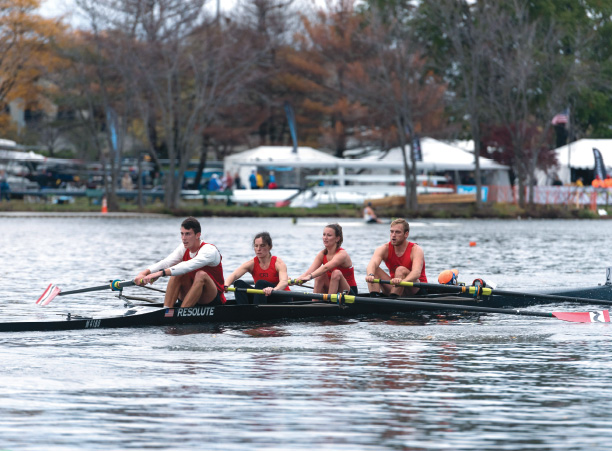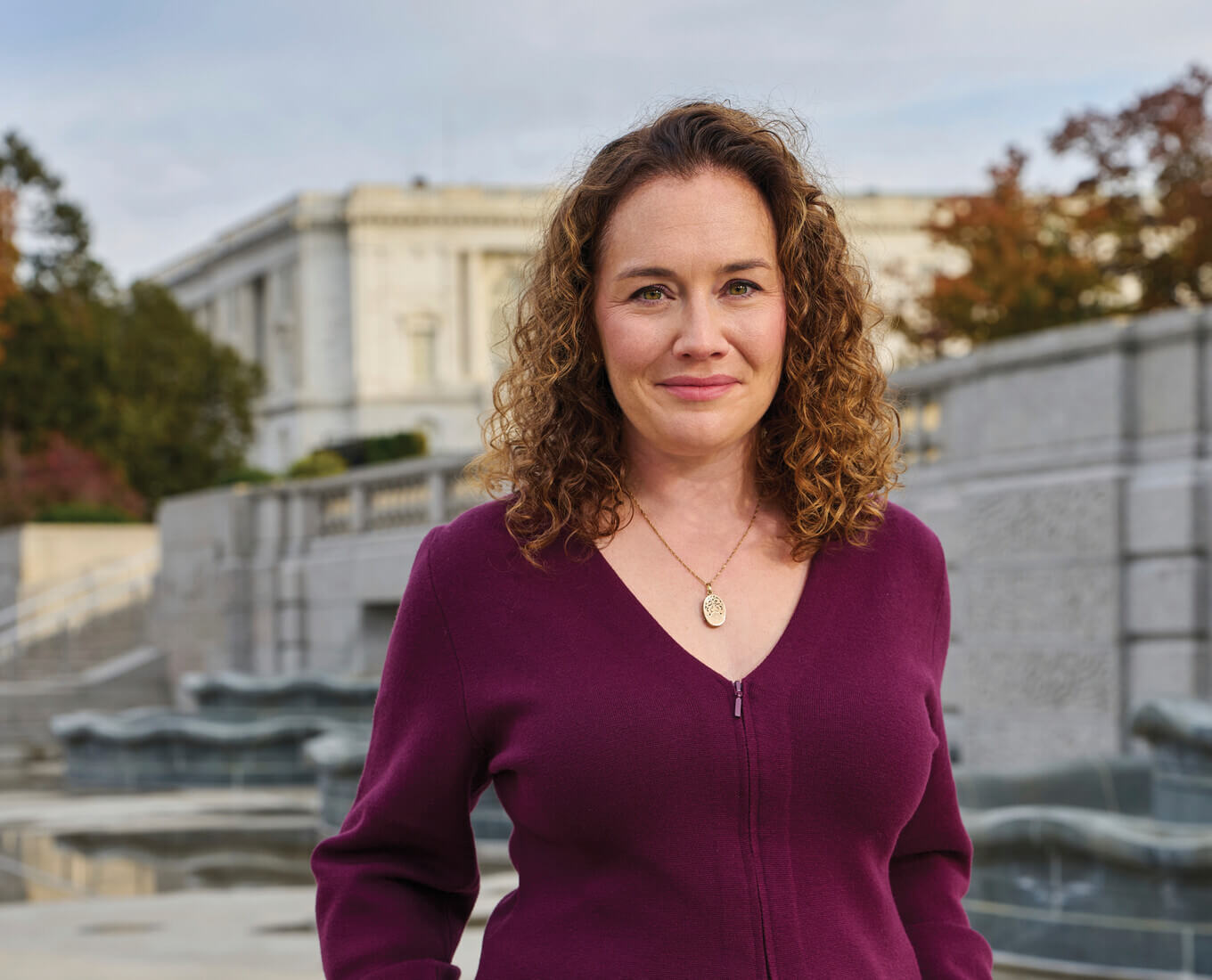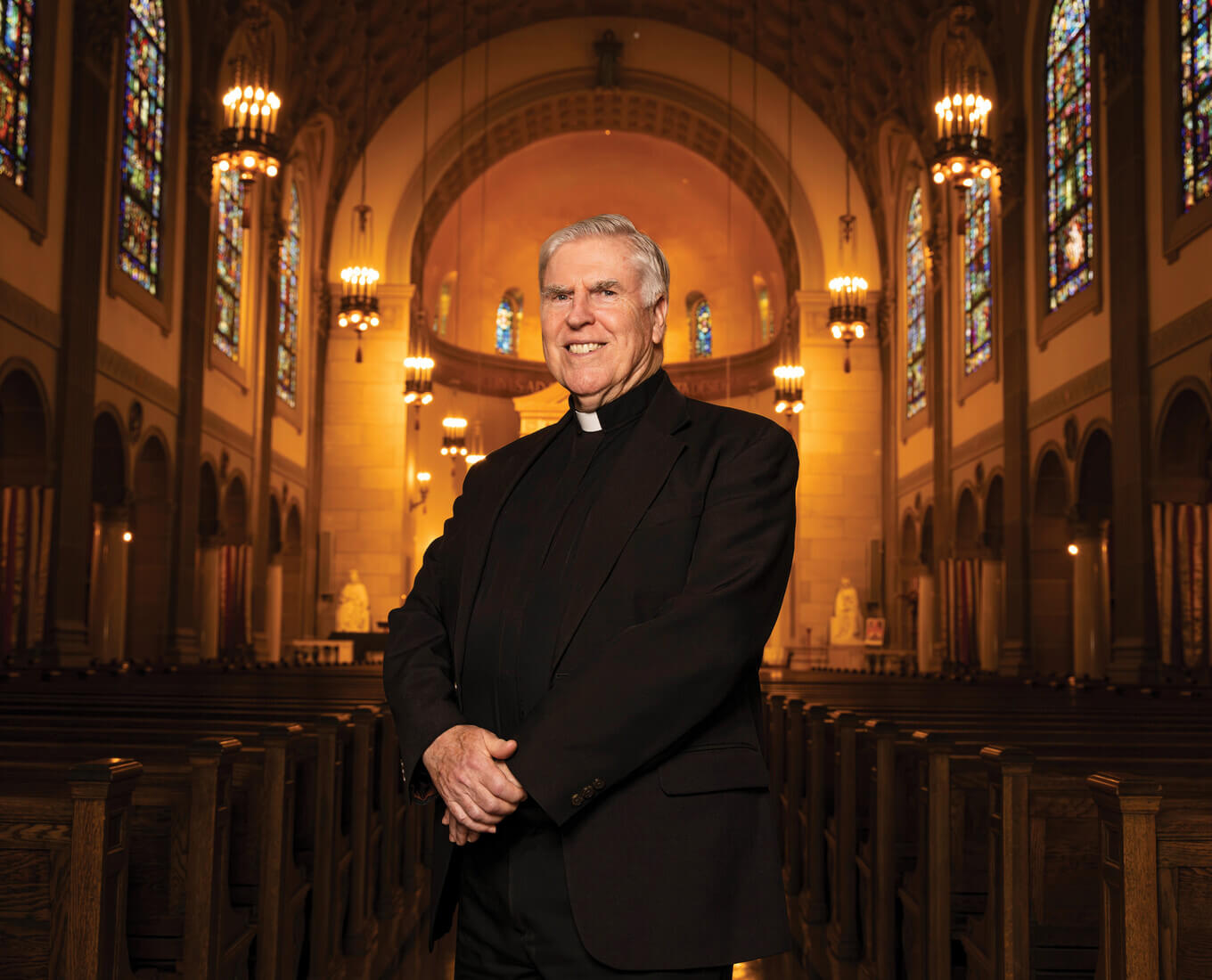
"Better. Not Bitter.” That’s one of the slogans Kate Barrett ’14 stared at in her room, for three grueling, intense months, at Boston’s Spaulding Rehabilitation Hospital. It was one of countless slogans and decorations, actually; thanks to her immediate family, huge extended family (43 cousins!) and dozens of Holy Cross friends, the room was so abundantly adorned that the wall paint was barely visible.
First it was all reds and pinks for Valentine’s Day. Then they went full-blast emerald for St. Patrick’s Day. Next, Easter pastels. No matter the day, Barrett’s room was filled with a riot of flowers, streamers, little-kid crayoned drawings and great big stacks of books and DVDs to pass the time.
The Spaulding staff said they’d never seen a room this decked out.
“Inspirational quotes and pictures were plastered all over the place,” Barrett recalls.
And for good reason: Barrett’s family knew she needed inspiration wherever she could find it. Barrett had arrived at Spaulding in February of 2013 following a freak accident during a ski trip in Spain, when she fell getting off a chairlift. The impact broke one of her vertebrae and the shattered bone compressed her spinal cord, paralyzing the lower half of her body. Doctors worried that she’d never use her legs again.
She was 20 years old.
“My dad came up with ‘better, not bitter’ and it became a kind of mantra for me,” says Barrett. “It reminded me that ‘bitter’ wasn’t a choice. But working to get better, every single day? That was my choice.”
The Accident
In February 2013, Barrett was midway through her year studying abroad in Léon, Spain. “I’d really hit my stride,” she says. “I loved Spain. I loved my host family. I’d gotten extremely close to the eight other Holy Cross students there with me. My Spanish had gotten really good.” When her finals were over, she went skiing with two Holy Cross friends north of Léon.
When she fell getting off the lift, “I had some awareness it was serious,” says Barrett. “I couldn’t move my left leg.” The ski patrol brought her down to the medic tent, and then an ambulance sped her to a trauma center in nearby Oviedo, where she was put in the intensive care unit. Her parents flew in from the U.S. The decision was made to do surgery to decompress Barrett’s spinal cord since bone from her L1 vertebra was pushing up against it. After a short recovery, another decision was made: to head back to the States for rehabilitation.
Barrett remembers a feeling of everything happening quickly. “I had no real sense of what all this meant. I was incredibly scared, but also sort of blindly optimistic,” she says. “I couldn’t yet imagine the obstacles and didn’t fully realize the seriousness of what had happened.”
And while her body had suffered the injury, her heart and mind were still stuck on the fact that her year abroad was ending so abruptly. “Honestly, at that moment, I was most devastated to leave Spain. My friends and host family were religiously by my side at the hospital every single day. It was breaking my heart to go.”
Recovery
Back in Boston, her doctors had measured hope; while she couldn’t feel her left leg at all, she could flex the quad muscle in her right. The proof that a signal from her brain was getting through set the stage for a rigorous course of physical and occupational therapy at Spaulding. “My therapists were three of the most incredible, motivated and compassionate women,” says Barrett. “They helped make my hospital stay bearable.”
For days, she practiced simply sitting up, a major challenge given her sense of balance was so compromised (when you can’t feel your legs, you have to learn to use your core differently, Barrett explains). Once she achieved that goal, she methodically learned how to transfer in and out of her wheelchair. After that, she rehearsed slowly standing up — without passing out. (One’s blood pressure must re-adjust after a long period of lying down.) She then practiced walking, holding on to rails supported by a full harness from above (she couldn’t yet bear any weight on her legs), with two physical therapists helping lock her knees from the back and front. In time, she began using a walker on her own, tentatively, minus the harness.
“Rehabilitation work is tedious and painstaking, and there are no overnight results,” says her mother, Marybeth Kearns-Barrett ’84. “But Kate never complained about that part of it. What Kate’s had to do by way of patience is extraordinary to me.”
There were bad times, to be sure. One of the worst came six weeks into her stay at Spaulding, when an MRI showed there was still some bone pressing on her spinal cord, and it was determined she needed a second surgery at Massachusetts General Hospital. Getting that news “was one of the most difficult moments,” says Barrett. “I felt like I was going back to ground zero.”
But the operation was a success. Afterward, Barrett found she could move her left leg a tiny bit, which meant signals were now registering in both limbs. Then it was back to Spaulding for more rehab. One physical therapist who witnessed a pivotal moment in Barrett’s recovery was Melissa Agrimanakis, a young woman in her late 20s who marveled at Barrett’s drive.
“I remember the first day I met her,” Agrimanakis says. “Most patients who’ve just suffered an injury like this are usually staring off into space and not paying attention to what I’m saying. I walk in and meet Kate, and she says ‘You’re the physical therapist? Okay. I want to move.’ I usually have to coerce people. But not Kate. She’d literally do whatever we asked.”
“(Agrimanakis) was the person who was there when I stood up for the first time, when I took my first steps,” Barrett recalls. “I think she realized how motivated I was, so she really pushed for me. And she also recognized I was a 20-year-old girl and could relate to me, make me feel a little more normal in a really abnormal, stressful situation.”
By the time Barrett was discharged in May, she was standing tall. She’s 5’10” – which, to staff, seemed that much taller after seeing her sitting for weeks. Now Barrett could inch the length of the hallway using her walker. She found herself contemplating another inspirational saying on her wall, tricked out with markers and glitter, that quoted Audrey Hepburn: “Nothing is impossible. The word itself says ‘I’m Possible!’”
Growing Up on Mount St. James
Barrett likes to joke that she first attended Holy Cross in utero. Her mother is the director of the Office of the College Chaplains, and began working at the College a few years before Kate was born. Until Kate was 3 1/2, the family lived right on College Hill.
“We used the campus as an extended playground,” says Kearns-Barrett. Kate’s father, Christopher Barrett ’83, was a stay-at-home dad then, and he’d take Kate and her big brother Daniel to romp on the pole vault mats at the Field House. They kicked a ball on the grass, pointed at the statues, frequented the cookouts at Campion House. Some of Kate’s earliest memories involved playing with Holy Cross students; her mom hired several as babysitters.
Later, the Barretts moved to Tatnuck Square in Worcester. What kind of a kid was this spirited blue-eyed girl? “Kate was always a very determined and strong-willed person,” her mom says over the phone, a rueful, appreciative smile evident in her voice. “Even as a little toddler, she insisted on picking out her own clothes and she always wanted to know the plan for the day. She wasn’t content to let the day unfold. She wanted purpose.”
Case in point: When Kate started first grade, her mother recalls, she was upset when the teacher didn’t assign homework. Her older brother got homework, argued young Kate – it wasn’t fair. When her teacher explained first graders didn’t get homework, the ambitious student wouldn’t let the matter drop. “She was driving us all nuts, and so I told the teacher to just give her worksheets to bring home,” laughs Kearns-Barrett. “Now Chris and I look back on Kate’s determination: What could be challenging then, we’re so grateful for now.”
Even with two Crusader parents, Barrett wasn’t sure she wanted in until she watched her big brother Daniel, a member of the Class of 2013, on Move-In Day. “I was jealous about how much he loved it!” she says. “Holy Cross had always been a part of me and now I wanted to be a part of it. The incredible academics. The strong, close-knit community. No other college gave me that vibe.”
She became a history major; Professor Ed O’Donnell’s first-year survey course on social justice movements, in particular, lit that fire. “I was so affected by how studying the past informs the present,” says Barrett. She was also inspired by her science requirement course on the biological principles behind HIV/AIDS, taught by Associate Professor Ann Sheehy. And she got involved with the Holy Cross chapter of Pax Christi, an international organization that promotes justice and peace, took several immersion trips (to Virginia, Texas and El Salvador) and embarked on a number of retreats, including Escape, for first-year students, and Manresa, which focuses on encountering God in your relationships and community.
Campus Support
After she left Spaulding in the spring of 2013, Barrett used that summer to gain strength for returning to Holy Cross for her senior year. Her family (including her sister, Sarah ’18, and brother, Matthew, now a high school senior) set out to support her continued rehabilitation at home. Each evening, after dinner, she’d put on her forearm crutches, align the arm cuffs and painstakingly walk outside. Her father would spot her, hugging the air around her hips, ready to catch her if she fell. Together, they walked as far as one house one night, two houses the next, until they eventually covered the whole block, her family and the neighbors watching discreetly, in quiet exultation, behind their windows.
Meanwhile, she spent several hours a day sweating it out at a remarkable organization recommended to her by Agrimanakis. Journey Forward, based in Canton, Massachusetts, looks and feels like a gym — dance music, sweaty people chatting, exercise machines — but it’s specially designed for people with spinal cord injuries. In 2014, Barrett appeared on The Today Show’s “Hope to It” series to promote Journey Forward. “That was cool,” says Barrett. “I credit so much of my recovery to Journey Forward, and they do such incredible work.”
With her senior year looming, “there were times I thought I was not going to be ready to go back to Holy Cross,” Barrett admits. “Holy Cross was so familiar and I loved it so much — but I was so different. Yet, in other ways, I was the same. It’s hard to convey that to people sometimes. While in the hospital, I had received such an outpouring of love from the community, but I was so worried about what it would be like to be back on campus.”
Kate being Kate, she was determined to walk Mount St. James with her crutches, rather than depend on her walker or wheelchair. Still, she worried: “Would I be able to navigate the hills? Was this insane?” But the community had her back. Margaret Freije, vice president for Academic Affairs and dean of the College, gave her parking space to Barrett for the year, since it was the closest spot to the senior’s on-campus apartment in Williams Hall. She got a car with hand controls, and was allowed to drive on campus. The grounds crew made sure to put extra salt outside her building when it snowed, and someone from the Department of Public Safety drove her if the weather was iffy.
She coordinated with the Office of Disability Services to make sure she had access to automatic doors and handicapped bathrooms. Her classes were grouped so that she didn’t have to switch between buildings. Roommates kept up her spirits. Classmates opened doors. Cashiers at Cool Beans carried her coffee for her. Barrett is awash in gratitude: “There were so many acts of kindness, I can’t possibly name them all!”
 Kate and her mother, Marybeth Kearns-Barrett '84, shared a jubiliant moment during commencement.
Kate and her mother, Marybeth Kearns-Barrett '84, shared a jubiliant moment during commencement.Back on Her Feet
At commencement in May 2014, Katherine Kearns Barrett walked across the stage, on her crutches, to get her diploma. The applause was thunderous. Her parents were — are — beyond proud. “Kate’s handled this situation with a tremendous amount of grace and determination,” says her father. “She’s very, very … ” His voice catches. “She’s very inspiring. She is always looking forward into the future. Never have I ever heard her look backward. Only forward.”
That fall, Barrett took a job teaching at Mother Caroline Academy in Dorchester, Massachusetts, a private, tuition-free school for young girls of limited financial means. She loved it, but felt called to blend teaching with health care, and is now enrolled in the master of science education program in speech-language pathology at Boston University. “Given my own experiences, I could relate to people who had undergone some sort of illness and injury and were in need of rehabilitation,” she says.
Today, she lives in Brookline, Massachusetts, with three roommates from graduate school. Every day, she walks a few blocks to the T to get to class, aided by her crutches, and then the few blocks back. “It’s definitely tiring,” Barrett admits. But she’s conscious that her disabilities pale in comparison to what some others live with, and she’s committed to speaking up for all of them.
“The world needs to be more accessible and inclusive to those of us with disabilities. When we talk about diversity, disability is one hundred percent a part of that,” she says. “I’m aware of what so many people had to do to make the Americans with Disabilities Act. One of the graces of having my own experience is my eyes are open — and I see there’s a long way to go.”
 Barrett, second from right, rows with teammates on the Charles River in Boston.
Barrett, second from right, rows with teammates on the Charles River in Boston.For the past two years, she’s competed at the Head of the Charles regatta in the Inclusion LTA 4 class. To translate: Inclusion means 50 percent of the rowers have a disability and are included with able-bodied rowers, and LTA means a rower must have use of at least one leg, arm and their trunk. The “4” signifies that four rowers are in the boat. In 2016, her boat took first place.
“Ironically, I’m now in the best shape of my life,” says Barrett. Indeed, these days, she rows like she rehabilitates: with fervor, purpose and a competitive spirit. But the little girl who needed to know what the plan was has changed.
“I’m more patient,” says Barrett. “I can’t get places quickly, and I realize I can’t do everything. I used to be very go-go-go, but my injury has allowed me to let some things go. I’m still a highly motivated and determined person, but now I can keep things in perspective. At the end of the day, it’s about spending time with people that I love. That’s one of the blessings that’s come out of this. For sure.”
Written by Katharine Whittemore for the Spring 2017 issue of Holy Cross Magazine
Visit magazine.holycross.edu for a web exclusive: Five Things That Got Kate Through Rehab.
About Holy Cross Magazine
Holy Cross Magazine (HCM) is the quarterly alumni publication of the College of the Holy Cross. The award-winning publication is mailed to alumni and friends of the College and includes intriguing profiles, make-you-think features, alumni news, exclusive photos and more. Visit magazine.holycross.edu/about to contact HCM, submit alumni class notes, milestones, or letters to the editor.

